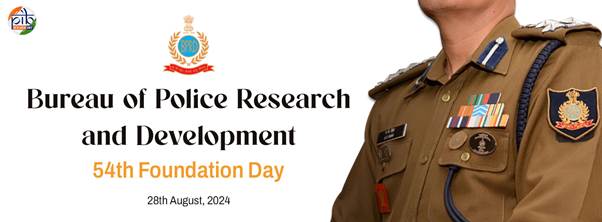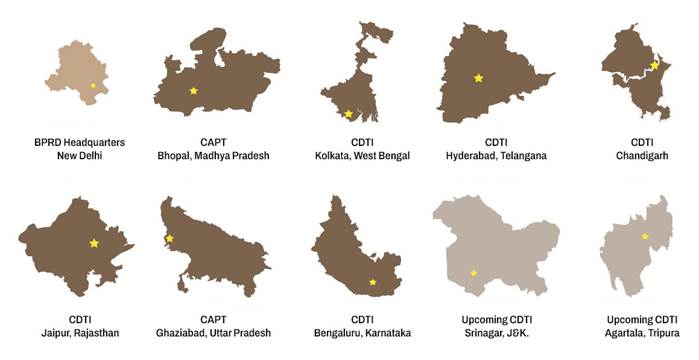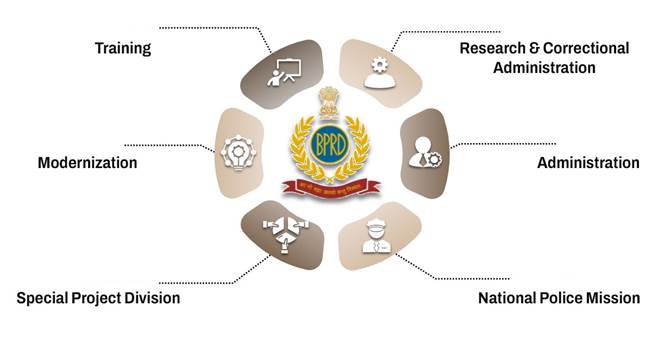doc2024827380801Bureau of Police Research and Development Foundation Day
Celebrating 54 Years of Pioneering Excellence in Policing
Introduction
The 54th Foundation Day of the Bureau of Police Research and Development (BPR&D) marks over five decades of dedication to the modernization and enhancement of India’s police forces. Established on 28th August 1970, the BPR&D was created under the Ministry of Home Affairs with a mission to provide a new direction to the then-existing Police Research and Advisory Council, founded in 1966. The Bureau was envisioned to take an active role in addressing critical police issues, promoting the systematic study of policing challenges, and integrating science and technology into police methodologies.

Initially, the BPR&D was structured with two primary divisions: Research, Statistics, and Publication, and Development. Recognizing the growing need to enhance police competencies, the Government of India, following the recommendations of the Gore Committee in 1971, added a Training Division in 1973. This division was aimed at improving the skills and capabilities of police personnel across the country. Further expansion occurred with the establishment of the Directorate of Forensic Sciences under BPR&D in 1983, followed by the inclusion of Correctional Administration in 1995, to address prison reforms comprehensively.
In 2008, the Government of India launched the National Police Mission under the BPR&D’s administrative control, with the goal of transforming the nation’s police forces into more effective instruments for maintaining internal security and addressing future challenges. As BPR&D celebrates its 54th Foundation Day, it reflects on its pivotal role in shaping modern policing in India and its continued commitment to advancing law enforcement through research, development, and innovation.
Vision
To promote excellence in Policing by:
- Investing in research & development policies and practices for Police and Correctional Services
- Seeking and securing appropriate technology for enhanced performance.
- Fostering scientific temperament
- Investing in Human Resource Development through training.
- Building Police and Correctional Administration as professional services for the people.
- Fostering cooperation and coordination among States & Central Police Organizations
- Promoting best practices in Police and Prison organizations.
- To transform the Police forces in the country for facing all the future challenges of internal security by equipping them with the necessary intellectual, material and organizational resources.
Locations

. BPRD Headquarters, New Delhi
. Central Academy for Police Training, Bhopal
. Central Academy for Police Training, Ghaziabad
. Central Detective Training Institute, Kolkata
. Central Detective Training Institute, Hyderabad
. Central Detective Training Institute, Chandigarh
. Central Detective Training Institute, Jaipur
. Central Detective Training Institute, Bengaluru
. Central Detective Training Institute, Srinagar (Upcoming)
. Central Detective Training Institute, Agartala (Upcoming)
Organisation and Divisions
The bureau is headed by an Indian Police Service officer of the rank of Director General, who is assisted by the Additional Director General. There are 6 divisions working under the supervision of Inspector General rank officers.

Divisions of BPR&D are as follows:
Research and Correctional Administration
The Research Wing of BPR&D, established on 28th August 1970, is tasked with identifying the challenges faced by law enforcement agencies across India and spearheading research efforts to address these issues. This involves initiating, stimulating, and guiding research activities in collaboration with various institutions, ministries, universities, research institutes, and state and union territories. The wing also focuses on the publication and dissemination of research findings to stakeholders, including States, Union Territories, Central Police Organizations (CPOs), and Central Armed Police Forces (CAPFs). Additionally, the Research Wing provides critical policy inputs to the Ministry of Home Affairs (MHA) on matters related to policing and correctional administration.
The Correctional Administration Wing, added to BPR&D’s responsibilities in 1995, is mandated to review and update training programs in response to evolving social conditions and advancements in scientific techniques. This wing is responsible for developing uniform training modules, including courses, syllabi, and curricula, to enhance the skills and knowledge of prison staff at various levels in the field of Correctional Administration. Moreover, BPR&D sponsors prison training courses and supports prison departments and training institutes across States and Union Territories, ensuring that correctional staff are equipped with the latest knowledge and techniques.
Training Division
The Training Division of the Bureau of Police Research & Development (BPR&D) is responsible for the comprehensive in-service training of police personnel across India. It coordinates both domestic and international training programs, including those facilitated by foreign security agencies, and collaborates with the Ministry of External Affairs (MEA) to train foreign police personnel in India. As the nodal agency for police training under the Ministry of Home Affairs, BPR&D standardizes training methodologies and develops policies for skill enhancement.
The division oversees five Central Detective Training Institutes (CDTI) in Chandigarh, Kolkata, Hyderabad, Jaipur, and Ghaziabad, which specialize in scientific investigation. It also manages the Central Academy for Police Training (CAPT) in Bhopal, which trains Deputy Superintendent of Police (DySSP) rank officers. Through its Training Intervention Scheme, BPR&D conducts specialized programs to build a pool of trained investigators nationwide. Additionally, BPR&D maintains training collaborations with about 25 countries, including the US, Canada, Italy, Singapore, and France, to enhance capacity-building efforts for Indian police officers.
Modernization and Technology Development
The Modernization and Technology Development division of the Bureau of Police Research & Development (BPR&D) is mandated to enhance the capabilities of police forces in India by leveraging technology as a force-multiplier. This division is responsible for reviewing the performance of various types of equipment currently used by police forces and developing new, advanced equipment to meet emerging needs. It maintains close liaison with national laboratories, public sector undertakings, and other scientific organizations to integrate cutting-edge technology into law enforcement.
Additionally, the division evaluates the Modernization Plan for Police Forces, providing expert advice to the Ministry of Home Affairs (MHA) on the selection of appropriate technologies, products, and services. To ensure the effectiveness of modernization efforts, the division also conducts impact assessments of various schemes, ensuring that the adopted technologies and practices contribute to the overall enhancement of policing in the country.
National Police Mission
Announced in 2005, the National Police Mission aims to transform India’s police forces into an effective instrument for maintaining internal security and addressing future challenges. The mission focuses on equipping police with the necessary material, intellectual, and organizational resources to foster a “New Vision” for policing.
Objectives of the National Police Mission include:
. Preparing for Emerging Challenges: Equipping police forces to handle evolving threats and complex scenarios.
. Specialization: Developing expertise in areas such as counter-terrorism, counter-insurgency, cybercrimes, and economic offenses.
. Strengthening Policing: Enhancing both metropolitan and rural policing capabilities.
. Attitudinal Change: Shifting the focus from a “force psychology” to a “service psychology” to improve the public perception and efficacy of the police.
. Technology Integration: Utilizing advanced technology to support and enhance policing operations.
. Community Policing: Promoting community policing initiatives to ensure effective delivery of services to citizens and foster trust between the police and the community.
Administration
The Administration Division of the Bureau of Police Research & Development (BPR&D) is led by an officer of the rank of IG/Director, supported by a team including a DIG and Assistant Directors (Adm), Systems, Construction, Procurement, Coordination, and Establishment. This division manages all administrative and financial matters, including the recruitment of personnel, procurement of materials and equipment, construction and maintenance activities, and the security of the BPR&D Headquarters. It also handles liaison with the Ministry of Home Affairs (MHA) and oversees IT-related matters.
The Administrative Division is responsible for preparing the budget grant for all divisions and monitoring expenditures regularly. Financial sanctions are processed through this division, which also manages welfare activities for its personnel in alignment with various Government of India schemes.
Special Police Division
The Special Projects Division, established alongside the inception of BPR&D, addresses critical areas beyond the scope of the Bureau’s other divisions. It focuses on significant and emerging issues such as anti-human trafficking, gender concerns, and matters related to minority and SC/ST communities, requiring attention beyond academic research.
This division also houses the Statistical Unit, which is crucial for collecting and analysing data to inform policy decisions and conclusions. The Special Projects Division serves as a repository for important tasks not covered by other divisions, ensuring comprehensive handling of pressing and specialized issues within the Bureau.
Important Publications
The Bureau of Police Research & Development (BPR&D) produces several key publications that serve as vital resources for police and correctional administration:
- Indian Police Journal (IPJ): BPR&D’s flagship quarterly publication, established in 1954, covers a range of topics including policing, police administration and management, correctional administration, prison management, forensics, digital evidence, and the sharing of best practices and standards among police forces.
- Data on Police Organisations (DoPO): An annual publication since 1986, DoPO provides detailed data on police manpower, infrastructure, vehicles, police stations, and more for States, Union Territories, Central Police Organizations (CPOs), and Central Armed Police Forces (CAPFs). This data is utilized by government agencies, NITI Aayog, and the Ministry of Home Affairs (MHA).
- Police Vigyan Patrika: BPR&D’s Hindi-language police journal, published semi-annually, offering insights and information relevant to the police community.
- Police Drill Manual: A comprehensive guide to various police drills, published as needed to provide detailed procedural guidance.
- Sajag Bharat & Vigilant India Magazine: A fortnightly magazine that highlights major achievements of the MHA, CAPFs, and CPOs.
- BPR&D News Bulletin: A quarterly publication that showcases the major activities and achievements of BPR&D, keeping stakeholders informed of the Bureau’s work and progress.
Conclusion
As the Bureau of Police Research and Development (BPR&D) celebrates its 54th Foundation Day, it reflects on over five decades of dedicated service to enhancing India’s policing and correctional systems. From its inception in 1970, the BPR&D has consistently evolved to address the dynamic needs of law enforcement through its diverse divisions, including Research and Correctional Administration, Training, Modernization and Technology Development, and Special Projects. The establishment of pivotal initiatives such as the National Police Mission underscores the Bureau’s commitment to equipping police forces with the necessary tools, technology, and expertise to meet future challenges. Through its extensive publications, strategic training programs, and ongoing modernization efforts, BPR&D remains at the forefront of fostering excellence in policing, ensuring a safer and more effective internal security framework for India. The Bureau’s continued innovation and dedication serve as a testament to its crucial role in shaping the future of law enforcement and correctional administration in the country.














